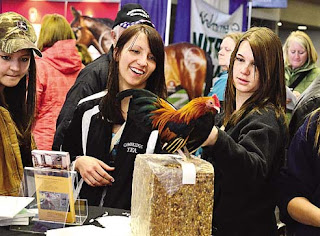“They eat everything,” Lockhart said. “They’ll even go after things like mice and rats.”
You needn’t give up on the barn cat just yet for rodent control, but where chickens really shine is insect management. Lockhart said they really relish maggots; the more maggots the chickens eat the less flies you’ll have buzzing around.
“Chickens will follow horses around in the pasture and pick through the droppings,” he said. “They’ll eat the insects that hatch in the manure.”
Likewise, the birds will pick through damp, untidy spots and gobble up insect larva as they go. Lockhart said the menu for bugs is extensive and includes ticks, grubs, spiders and box elder bugs, among others. The world is a smorgasbord for a chicken.
 |
| Elvis the rooster was a major hit during Midwest Horse Fair |
While Lockhart and his associate Susan Troller, owner of Cluck, The Chicken Store in Paoli, both said chickens are easy to keep and manage, the creatures will take some attention. There are many different breeds to choose from. Leghorns and Bantams are popular but there are breed differences so ask around for a good fit for your stable.
“We do recommend a coop,” Troller said. “There are people who manage chickens without a coop but then again, because chickens are for everyone’s dinner, we think it’s best to have a good coop to put them in at night.”
There are lots of chicken-coop plans available online for the do-it-yourself builder and there are premade models available from various outlets. Size the coop to the number of birds in the flock.
How many chickens should a farm have? “Make sure you get more than one,” Lockhart said. “A single chicken is an unhappy chicken.” Lockhart says six or eight birds in a nice number but to always order extra because you’re bound to lose a few.
Baby chicks are frequently shipped and delivered in boxes. Local feed stores and Troller can answer questions and provide needed advice. Once you have the birds you should focus on feed and water.
A 40-pound bag of chicken feed costs about $15 and depending on size, each bird should get about 1/4 pound of feed each day. A flock of eight, then, will need about 2 pounds of feed a day. Feed quality can vary but most should meet basic nutritional requirements and can also provide needed vitamins and minerals that the chickens might not find in the things they eat around the stable. Chickens also need “grit,” an inexpensive material that aids in digestion.
While Lockhart, a Nutrena poultry consultant, noted the biological benefits of chickens around the barn, he added there are other good reasons to have the birds around. “There’s nothing like some chickens around to help a spooky horse settle down,” he said. “Chickens and horses make great companions.”
No comments:
Post a Comment